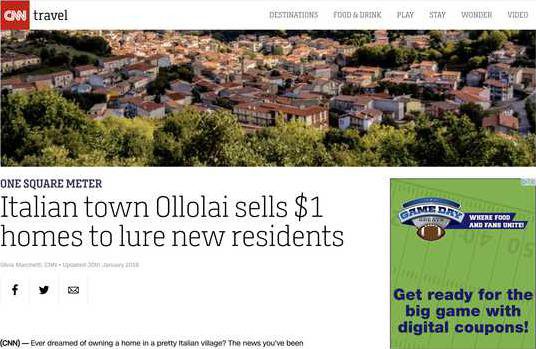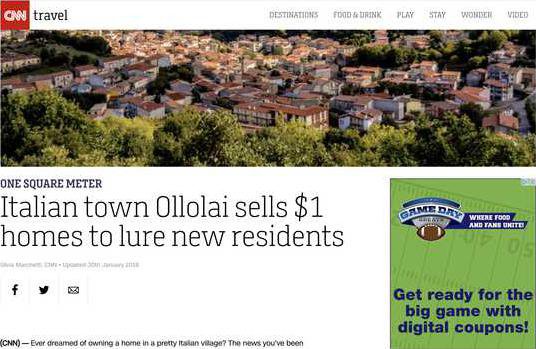Buying a home in a quaint Italian village shouldnt seem like a pipe dream anymore. The Italian town of Ollolai wants you to buy an abandoned home in the village for just over $1.
However, theres a catch. Owners must commit to refurbishing them within three years, which can cost close to $25,000, according to CNN.
The town hopes the $1.20 asking prices will draw new people into the struggling community, which is at risk of becoming a ghost town. Population of the town has dropped from 2,250 to 1,300 residents in the past 50 years.
The town was once the capital of Barbagia, a natural mountainous region in Italy. Young people slowly left the community for the urban areas of Italy.
"We boast prehistoric origins," said Efisio Arbau, the mayor of Ollolai. "My crusade is to rescue our unique traditions from falling into oblivion. Pride in our past is our strength. We've always been tough people and won't allow our town to die."
Italian cities have attempted this move before. According to BBC, the mayor of Bormida floated the idea of struggling hamlets drawing in residents by offering people 2,000 euros ($2,373.88) to relocate there. Nearly 17,000 people responded.
However, Mayor Daniele Galliano walked back the idea, saying he had been misunderstood and the town didnt have enough money to carry out such a plan.
Similarly, the Italian town of Candela lured families by offering them a nice bonus for relocating there, BBC reported.
"This is how it works: 800 euros for singles, 1,200 euros for couples, 1,500 to 1,800 euros for three-member families, and over 2,000 euros for families of four to five people," local official Stefano Bascianelli told BBC.
Interested parties had to sign an application, accepting that they would receive 50 percent of the money after the first year and 50 percent after the second year.
A village in Switzerland attempted to attract new residents by paying a family of four $70,000, according to the Deseret News. The village recently voted to accept this concept through a referendum. However, candidates must be from Switzerland and must be younger than 45 years old.
However, theres a catch. Owners must commit to refurbishing them within three years, which can cost close to $25,000, according to CNN.
The town hopes the $1.20 asking prices will draw new people into the struggling community, which is at risk of becoming a ghost town. Population of the town has dropped from 2,250 to 1,300 residents in the past 50 years.
The town was once the capital of Barbagia, a natural mountainous region in Italy. Young people slowly left the community for the urban areas of Italy.
"We boast prehistoric origins," said Efisio Arbau, the mayor of Ollolai. "My crusade is to rescue our unique traditions from falling into oblivion. Pride in our past is our strength. We've always been tough people and won't allow our town to die."
Italian cities have attempted this move before. According to BBC, the mayor of Bormida floated the idea of struggling hamlets drawing in residents by offering people 2,000 euros ($2,373.88) to relocate there. Nearly 17,000 people responded.
However, Mayor Daniele Galliano walked back the idea, saying he had been misunderstood and the town didnt have enough money to carry out such a plan.
Similarly, the Italian town of Candela lured families by offering them a nice bonus for relocating there, BBC reported.
"This is how it works: 800 euros for singles, 1,200 euros for couples, 1,500 to 1,800 euros for three-member families, and over 2,000 euros for families of four to five people," local official Stefano Bascianelli told BBC.
Interested parties had to sign an application, accepting that they would receive 50 percent of the money after the first year and 50 percent after the second year.
A village in Switzerland attempted to attract new residents by paying a family of four $70,000, according to the Deseret News. The village recently voted to accept this concept through a referendum. However, candidates must be from Switzerland and must be younger than 45 years old.








